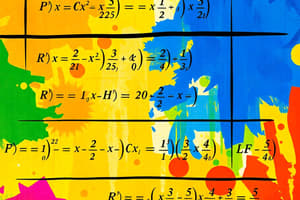Podcast
Questions and Answers
What is the nature of the function f5 on the interval [−5, −3]?
What is the nature of the function f5 on the interval [−5, −3]?
- Constant
- Strictly decreasing
- Neither strictly increasing nor decreasing
- Strictly increasing (correct)
What is the x-value of the strict local minimum of the function f6?
What is the x-value of the strict local minimum of the function f6?
- 6
- 3
- −3
- 2 (correct)
What is the nature of the function f7 on the interval (−∞, 8)?
What is the nature of the function f7 on the interval (−∞, 8)?
- Constant
- Strictly decreasing (correct)
- Neither strictly increasing nor decreasing
- Strictly increasing
What is the nature of the function f8 on the interval (−∞, 1)?
What is the nature of the function f8 on the interval (−∞, 1)?
What is the nature of the function f1?
What is the nature of the function f1?
What is the nature of the function f2?
What is the nature of the function f2?
What is the nature of the function f3 on the interval (−∞, 7)?
What is the nature of the function f3 on the interval (−∞, 7)?
What is the x-value of the inflection point of the function f3?
What is the x-value of the inflection point of the function f3?
What is the nature of the function f4?
What is the nature of the function f4?
What is the nature of the function f8 on the interval (1, +∞)?
What is the nature of the function f8 on the interval (1, +∞)?
Flashcards are hidden until you start studying
Study Notes
Derivatives and Tangent Lines
- f1(x) = 35x - 6, f1'(x) = 35, f1'(1) = 23, L1(x) = 23(x - 1) - 7
- f2(x) = -6x^4, f2'(-2) = -8, L2(x) = 8(x + 2) - 4
- f3(x) = √x, f3(1/4) = 2, L3(x) = 2x - 4 + 1
- f4(x) = -12x + 34, f4'(2) = 10, L4(x) = 10(x - 2) + 4
- f5(x) = 2x^2 + 16x + 32, f5'(-3) = -13, L5(x) = -13(x + 3) + 4
- f6(x) = -6 ln(7) * 7^x, f6(0) = -6 ln(7), L6(x) = -6 ln(7) x + 41
- f7(x) = -12(2 - 3x)^3, f7'(2) = 768, L7(x) = 768(x - 2) + 256
- f8(x) = (2x - 2)e^(x - 2)^(-15), f8'(-3) = -8, L8(x) = -8(x + 3) + 1
- f9(x) = 2e^(2x) ln(3x - 5) + e^(2x) / (3x - 5), f9'(2) ≈ 163.79, L9(x) = 163.79(x - 2)
- f10(x) = (10x + 6x)(8x^3 - 9x^2 + 100) + (5x^2 + 6x - 7)(24x^2 - 18x), f10'(-2) = 132, L10(x) = 132(x + 2)
Monotonicity and Extreme Values
- f1(x) = -8x, f1'(x) = -8 < 0 everywhere, f1 strictly decreases everywhere
- f2(x) = x^2 - 6x + 42, f2'(x) = 2x - 6, f2 strictly decreases on (-∞, 3], strictly increases on [3, +∞)
- f3(x) = x^3 - 243x, f3'(x) = 3x^2 - 243, strictly increases on (-∞, -9], strictly decreases on [-9, 9], strictly increases on [9, +∞)
- f4(x) = x^3 + 3x^2 + 3x + 100, f4'(x) = 3x^2 + 6x + 3 ≥ 0, f4 strictly increases on ℝ
- f5(x) = -3x^4 - 32x^3 - 90x^2, f5'(x) = -12x^3 - 96x^2 - 180x, f5 strictly decreases on ℝ
Convexity and Inflection Points
- f1(x) = 21/x + 7, f1''(x) = 0, f1 is everywhere concave up and concave down
- f2(x) = x^2 - 6x + 42, f2''(x) = 2 > 0, f2 is strictly concave up everywhere
- f3(x) = x^3 - 21x^2, f3''(x) = 6x - 42, f3 is strictly concave down on (-∞, 7], strictly concave up on [7, +∞), x = 7 is an inflection point
- f4(x) = x^3 + 3x^2 + 3x + 100, f4''(x) = 6x + 6
Studying That Suits You
Use AI to generate personalized quizzes and flashcards to suit your learning preferences.




